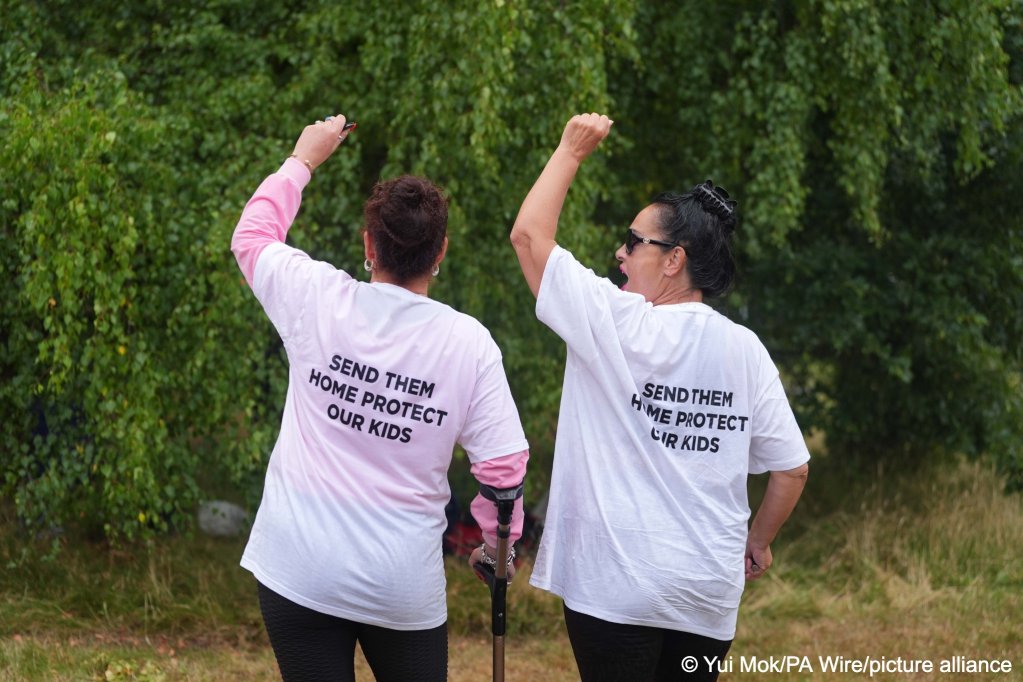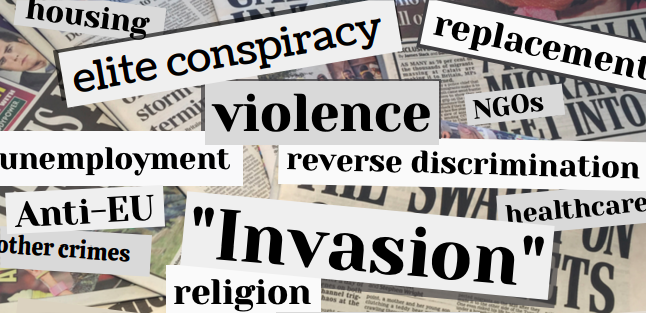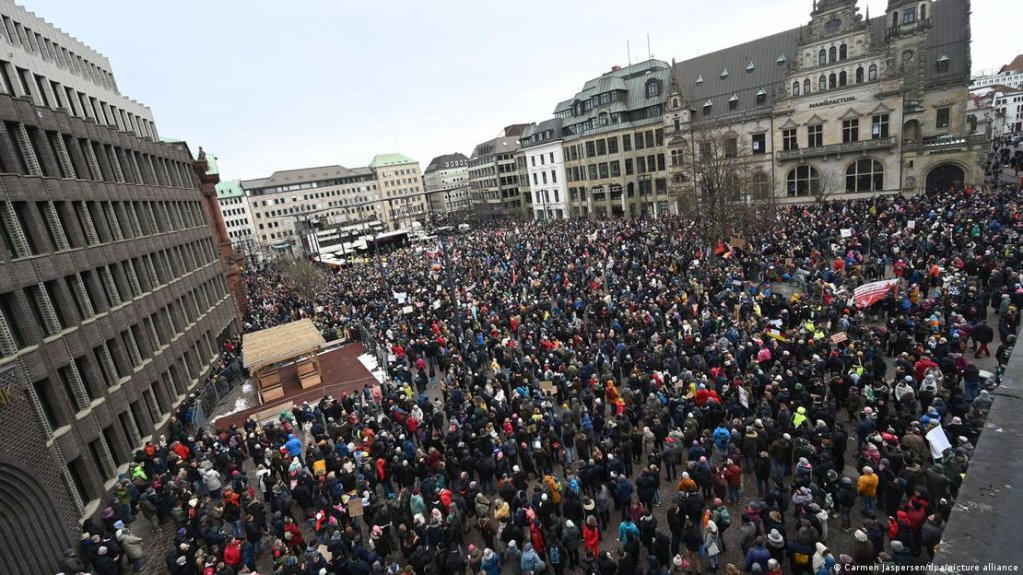From her home country, Brazil, to her current base in Berlin, journalist and researcher Andrea Dip has been tracking the rise of far-right movements. Speaking to InfoMigrants, Dip reveals how the far-right rhetoric of fear and division moves through parliaments and social media, shaping both policies and public sentiment toward migrants.
A young woman sat across from Andrea Dip, confiding her biggest fear: being attacked by a migrant while walking down a street in Germany. She admits that she has never been threatened by a migrant, nor did she know anyone who had. But that did not diminish her conviction that her anxiety was real.
The young woman was affiliated with Germany’s far-right party, Alternative für Deutschland (AfD).
"This distrust of migrants doesn’t come out of nowhere," journalist and researcher Dip told InfoMigrants. The negative portrayal of migrants has been carefully planted in campaign speeches, repeated across parliamentary podiums, spread through social media, and embedded into policies of far-right parties across Europe.
Dip has been investigating far-right movements since Jair Messias Bolsonaro came to power in her home country, Brazil. Now based in Berlin, Dip studies far-right movements as part of the Research Against Global Authoritarianism Project (ReGA) and as a guest researcher at Berlin's Freie Universität (Free University).
What once lurked at the fringes of European politics now sits in parliaments and government ministries. Parties such as the AfD, France’s National Rally, and Italy’s governing Brothers of Italy have turned anti-migrant rhetoric into a political force based on fear, resentment, and a false narrative of national decline.

"The AfD in Germany is an emblematic case because, despite having been considered right-wing extremist by German intelligence, it has grown in popularity, won elections in regional parliaments, and today surpasses the popularity of the party of the current Chancellor Friedrich Merz," said Dip.
The advance of the far right in Europe over the last decade is a revival of the continent's darker history of fascism, racism, and colonialism, but with one main difference. The multiple crises affecting Europe, ranging from inflation to housing shortages and job scarcity, are presented to the public as consequences of migration. "This time, migrants are seen as the enemy," said Dip.
Far-right ideology is no longer a relic of the past. It is a future that some Europeans, such as the young woman who confided in Dip, now want to build.
Read AlsoGerman elections: What does the AfD say about migration?
Organized and well-funded movement
To understand how this transformation is happening, Dip has spent the last three years quietly slipping into far-right conferences in Hungary, Brussels, Prague, New York, Brazil, and beyond. What she found there challenges the assumption that these movements are chaotic or poorly organized.
"They are very practical in their strategies," she explained. Behind the rallies and provocative social media posts exists a well-funded infrastructure with global connections. Conferences often feature senior political figures who include ministers, deputies, and even prime ministers. Participants map their opponents, develop legislative tactics, and plan campaigns. Nothing about the rise of the far-right authoritarianism is accidental, Dip emphasized.
A 2025 study, The Next Wave: How Religious Extremism Is Regaining Power by the European Parliamentary Forum for Sexual Reproductive Rights, shows that far-right movements across Europe are benefiting from deep pockets and powerful alliances that blend religious extremism and far-right populism with political influence and private funding. The result is a well-coordinated campaign that is strategically positioned through media, NGOs, and political parties that push anti-immigrant policies into the mainstream. The success of these coalitions lies not only in money, but in messaging that underwrites sentiments such as "Make Germany great again" and "Poland for Poles" as nationalistic and patriotic.
Citing the findings of the report, Dip explained that an estimated 275 anti-gender and far-right organizations moved more than 1.18 billion dollars (1.015 billion euros) in Europe between 2019 and 2023. The majority of this money came from within Europe itself, accounting for approximately 73 percent (869.5 million dollars or 748.0 million euros), with additional funding from Russia (211.9 million dollars or 182.2 million euros) and American Christian-right organizations (104.3 million dollars or 182.2 million euros).
Other countries with large amounts of anti-gender funding were Hungary, France, the United Kingdom, Poland, and Spain.
For migrants, asylum-seekers, and refugees, the consequences are visible in parliament through migration policy shifts and on the streets through a wave of anti-migrant protests across Europe.
Read AlsoMerz says Europeans fear 'public spaces' due to migration
Appealing to the youth
Increasingly, noted Dip, gender is being used as a political tool in this narrative. Migrant men are portrayed as threats to women and children in order to justify their exclusion. The need to protect women and children is used as a basis for hostility towards male migrants.
Dip recalled attending a conference where a far-right parliamentarian spoke about her daughter’s alleged assault by a migrant. "I don't know if the story is true, but even if it is, and of course it is a shocking and terrible story, and certainly all legal measures have been taken. But it is unfair to use one alleged case to accuse a diverse community of thousands of immigrants."
More than accuracy, the goal is to instill fear and distrust through emotional impact.

According to Dip, such messaging has been very effective among young people who are navigating economic instability and searching for identity.
"We have observed that many young people and adolescents, mainly boys, have had their first political contact with the far right -- but not only boys, many girls as well. The boys talk about pride in their country, hatred of immigrants, national identity, job losses, and places in schools and universities. The girls talk about this too, but they add another layer of fear of gender-based violence."
Read AlsoUK: Is there an increasing number of sexual assaults committed by male migrants?
Gender as a political tool for division
The precarious combination of resentment, individualism, and isolation is reinforced by other factors, such as social media and forums that spread hatred towards women and influencers who dispute the concept of alpha males.
"It is important to note that the far right is aware of this and has been exploiting uncertainties, creating opportunities and political training courses for young people, and increasingly specializing in disseminating content on TikTok, Instagram."

A far-right politician Dip interviewed said that the movement is deliberately targeting heterosexual, white boys who do not see themselves represented by progressive gender and sexuality configurations.
The far right has managed to dress up reactionary, fascist thinking as edgy rebellion, political incorrectness, and subversion.
"They invest time and money in these messages that say that migrants are not welcome here," said Dip.
Read AlsoFact-check: Is gender-based violence in Italy linked to irregular migration?
Pushing back against exclusion
Dip acknowledged that pushing back against the exclusionary tactics is difficult, especially for those constantly told they do not belong. Yet her message to migrants, refugees, and their communities is one of courage and visibility.
"We need to find a way to burst this bubble, because at the end of the day, it is a soap bubble. The lies that the far right tells are fragile and can easily burst. But we need to find a way to engage in dialogue, especially with young people," she said. That means participating in local councils, joining neighborhood groups, proposing school events about different histories, and creating points of connection and resonance with migrant life and culture.

"We often don’t feel we have the right to occupy these spaces," said Dip, adding that she is herself a migrant. "I know it's not easy. It's not easy to hear that you don't belong, that you're not welcome. We are far from home, far away from our families and the people we love. But we need to find these openings for dialogue and political education. Our very survival depends on it."
